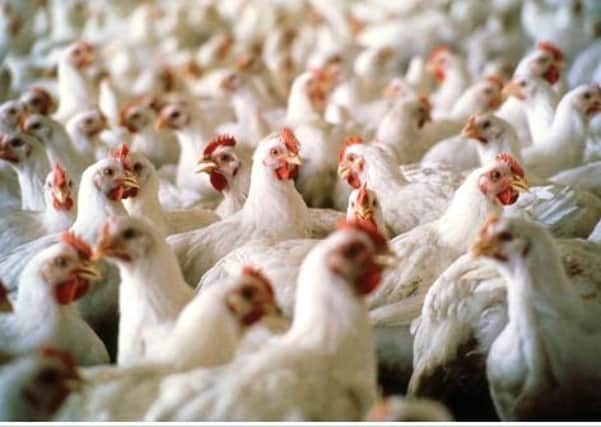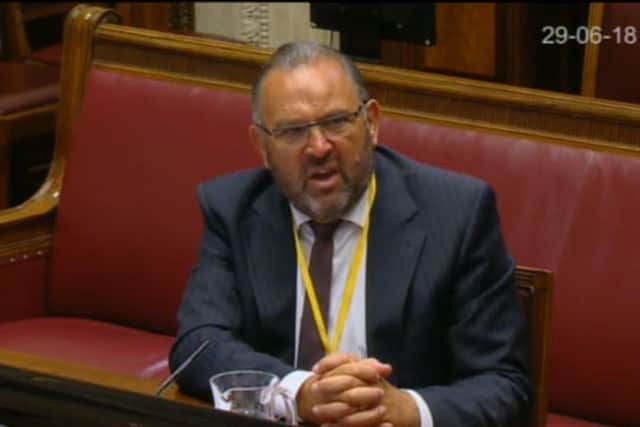Moy Park knew it wasn’t paying its RHI farmers enough – and that it was cashing in


That comment comes in a new tranche of documents from inside Northern Ireland’s monopoly poultry processor which shows that Moy Park knew it was paying its farmers far less for heat than was the case in GB – but it also knew many of them were getting RHI cash.
The evidence appears to substantiate poultry farmers’ claims that while they have borne the brunt of public anger for the huge sums they were getting from taxpayers, Moy Park’s complex pricing structure meant that much of the money was ultimately ending up in its coffers.
Advertisement
Hide AdAdvertisement
Hide AdThe company, which has a turnover of £1.6 billion and is so dominant that most farmers have no choice but to sell their chickens to it, told BBC Spotlight in 2016 that it “derives no financial benefit from poultry farmers participating in the RHI scheme”.


But, as the News Letter revealed on Saturday, that was wrong and misled the public.
Senior figures have tied themselves in knots, either rejecting or playing down claims that RHI cash helped fuel its massive expansion over recent years, but in other instances accepting that had happened.
Within a huge release of evidence which has now been published by the RHI Inquiry, the company’s head of Northern Ireland agriculture projects, David Mark, discussed in detail with colleagues how much they should pay poultry farmers for their heat.
Advertisement
Hide AdAdvertisement
Hide AdPreviously, when the farmers had gas heating Moy Park had paid for all of their fuel as a business expense.
But as more of them joined RHI, that changed – and Moy park cashed in.
As more and more of the company’s contracted farmers entered RHI – as the company was encouraging them to do by advertising the scheme to them and even talking to banks on their behalf – Moy Park started to cut the percentage of heat for which it would pay, and that was just one of the ways in which the company indirectly made significant profit from RHI.
In October 2015, right at the height of the spike in applications which crippled the RHI budget and meant money had to be taken from public services to plug the gap, Moy Park finance manager Willy Patton sent a proposal to Mr Mark.
Advertisement
Hide AdAdvertisement
Hide AdHe suggested that Moy Park could cut its bill for heat from the current £47.42 per thousand birds to just £38.76 - and then calculated that this would be a saving of £856,000 a year for the company.
The finance manager’s proposal equated to Moy Park paying for 255kg of wood pellets for every thousand chickens.
Mr Mark proposed a slightly higher allowance of 266kg, pointing out that “we have some data from GB”, where Moy Park also has poultry operations, and there “on the best farms they are showing a 330kg fuel usage”.
He went on to say that “if GB is correct at 330kg that’s 48% extra heat so 20% well discounted! Look if nothing else the saving covers a bit of my salary for next year!!!!”
Advertisement
Hide AdAdvertisement
Hide AdMr Mark was more familiar with RHI than most people – even within Moy Park.
Just a fortnight earlier, he and his wife Joy had applied to enter the non domestic RHI scheme after installing a biomass boiler to heat their home - something possible within the rules because they were renting out part of the house to guests.
When Mr Mark was before the RHI Inquiry he was asked why Moy Park was not paying its farmers for all the heat they needed, and whether this was because the company knew that taxpayers were generously subsidising that heat.
It was put to him that he had “comparative data from GB” which showed that farmers needed more heat than Moy Park was prepared to pay for.
Advertisement
Hide AdAdvertisement
Hide AdMr Mark denied that the GB data showed that, saying: “They weren’t, when we looked at them earlier in the period. But, when we’ve relooked at them — and I looked at them for last year [2017] — they have increased because of some issues with how they utilise gas on those farms.”
Similarly, in his written witness statement to the RHI Inquiry, Mr Mark was clear that he did not have access to GB data showing the need for far more heat at the point where the company was cutting how much it was prepared to pay farmers for heat.
He said in writing: “In GB, Moy Park has data from farms it operates that do not benefit from any direct RHI income – in cases Moy Park purchases all fuel used or purchases energy to a contract price on its farms. Moy Park data shows a usage of 2,100kwh per thousand for 2017/18 (I have only had access to this data to [sic] since I took over the responsibility for the GB estate in January 2018).”
In a similar vein, Moy Park’s recently-departed chief executive, Janet McCollum, told the inquiry that “we didn’t have any data available” on responsible heat usage and therefore the company had not deliberately paid its farmers less than the heat which the required .
Advertisement
Hide AdAdvertisement
Hide AdBoth she and Mr Mark insisted that if there was any shortfall between what the company was prepared to pay and what was necessary, this was not an attempt by Moy Park to make money for itself, but was an attempt to curtail what it recognised as the perverse burn to earn incentive to waste heat which was at the heart of the RHI scheme.
Ms McCollum’s successor as chief executive, Chris Kirke, told the inquiry: “The issue of a shortfall between fuel allowance and actual grower fuel costs being somehow shored up by RHI scheme tariffs was never considered by Moy Park. Moy Park does not accept that there was a shortfall.”
However, the new evidence revealed today shows that is not right.
When the News Letter put it to Moy Park that the evidence shows it was consciously choosing to pay its Northern Ireland farmers less for heat than it believed was reasonable in GB, the company did not address the issue but instead said: “Having participated fully with the inquiry process, we welcomed the publication of its report in March which found no fault with the company’s use of the RHI scheme. Its findings and recommendations were not directed towards the business.”
Advertisement
Hide AdAdvertisement
Hide Adl For more revelations from the newly-released RHI Inquiry evidence, see tomorrow’s News Letter.
——— ———
A message from the Editor:
Thank you for reading this story on our website. While I have your attention, I also have an important request to make of you.
With the coronavirus lockdown having a major impact on many of our advertisers - and consequently the revenue we receive - we are more reliant than ever on you taking out a digital subscription.
Subscribe to newsletter.co.uk and enjoy unlimited access to the best Northern Ireland and UK news and information online and on our app. With a digital subscription, you can read more than 5 articles, see fewer ads, enjoy faster load times, and get access to exclusive newsletters and content. Visit https://www.newsletter.co.uk/subscriptions now to sign up.
Advertisement
Hide AdAdvertisement
Hide AdOur journalism costs money and we rely on advertising, print and digital revenues to help to support them. By supporting us, we are able to support you in providing trusted, fact-checked content for this website.
Alistair Bushe
Editor